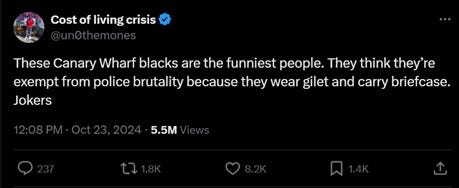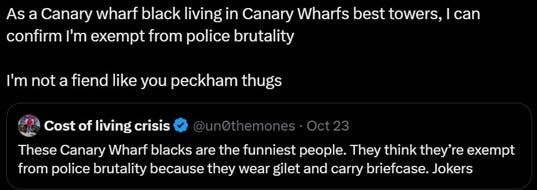The Canary Wharf Black
From Biafra to Deloitte
‘It is not enough that I should succeed: my enemies must fail.’
—Nigerian proverb, maybe.
The best way to understand history is, in fact, to LARP. The snotty seventeen-year-olds on ‘fashy’ Discord servers wearing East German police uniforms really did have it right. When I’m standing in a field in one shire or another, I do not pull out my phone to tweet a lion emoji, or wax lyrical about how beautiful the countryside really is; instead, I pretend I am standing where the great men of history once stood. In Edginton, I did not see a fourteenth-century church: I had a vision of Alfred the Great’s decisive victory over the Great Heathen Army. In Rouen, I pictured a century-long tug-of-war between the Plantagenets and the House of Valois. In Berlin, standing in front of Brandenburg Gate, I imagined myself to be a Prussian officer, goose-stepping to the Königgrätzer Marsch, home from a pyrrhic victory in Silesia.
In London, Nicolas (30 ans) pays for the DLC add-ons. You no longer need to travel to Ottoman backwaters to get a feel for the empire: just take a walk from Finsbury Park to Southgate instead. Here, you’ll see a reenactment of the Battle of Manzikert, but instead of fighting for control of Anatolia, they’re fighting over the gyro, the charcoal grill, and nightclub licenses. In due time, they will all be subsumed by the brutish Albanian, with marauding Algerian reavers picking up the scraps. Plus ça change.
In the very latest expansion pack for ‘London’, you can get a first-hand experience of everything that led up to the genocidal conflicts in post-colonial Africa. If you stand in Southwark Park, you’re effectively in the demarcation zone between the West Indian matriarchs of South London, and the West African aunties scolding their children for hanging out with the Jamaicans again. One figure caught in the cross-fire is the innocent Biafran: the hard-working Igbo (or whichever group Fraser Nelson said it was) in Canary Wharf who wants to distance himself from the intrigues and infighting of the wider black community — much like the Biafrans themselves when they declared a short-lived independence from Nigeria in 1967. This individual has become known on X as the ‘Canary Wharf Black’.
When the Chris Kaba news came in, the usual upheaval followed: people poured out onto the streets, screeching about the supposed injustice of it all; that the police are murderers, and Chris Kaba was a nice young boy led down the wrong path. The white libtard conscripts and their ethnic minority allies joined in, for a time. That was until Chris Kaba’s many crimes were revealed after Martyn Blake’s acquittal: domestic violence, a shooting in a packed nightclub, among others. Bodycam footage sealed the deal: it showed Kaba using his vehicle as a battering ram. The jury was out: there would be no riots; no civil unrest; no George Floyd-style murals. BLM had been rejected at the ballot box.
Had a riot actually taken place, defending a dangerous career criminal like Kaba, this would have presented a serious problem for the police and the government. It is highly unlikely that the police would have been anywhere near as heavy-handed with these rioters as they were with the rioters responding to Southport; as such, this would have cemented the notion (and indeed, the reality) of ‘two-tier Keir’. Keir kept conspicuously quiet, as did — by and large — race-baiting charlatans like Dawn Butler and Diane Abbot. Yvette Cooper made some concessions to angry police officers. Hutu Radio went silent.
As the black community flocked to X to attack the police for responding with lethal force instead of shooting the tires (or maybe they should have shot the paddle shift back twice into neutral), our Biafran on the Deloitte graduate audit and assurance scheme took a stand. Where others made excuses for a violent criminal, our Biafran suggested that maybe, just maybe, a criminal shouldn’t use his vehicle as a weapon if he’s surrounded by police. But when you take a stand against ‘Black Twitter’ orthodoxy, be prepared for a multi-pronged attack from middle-aged podcasters, self-proclaimed ‘producers’, fruity left-wingers like Jason Okundaye, and hyena influencers like Oloni. ‘Cost of living crisis’ angrily writes:
Now, as all readers will know, this is quite transparently false. The police are not, in fact, going to brutalise anyone — black or white — who works a corporate job in Canary Wharf. The police will be heavy-handed with a known violent criminal — black or white — suspected of carrying firearms. It’s that simple, though it’s clearly difficult for some to understand.
I am not going to go into too much detail on why exactly there is an underlying dislike, even hatred, of the successful in certain communities — I would merely be repeating all of Kemi Badenoch’s banalities from her forum posting days. What is important to note is that this isn’t merely class warfare as we know it. In the West, the case for the redistribution of wealth is made on moral grounds; that the poor should have some dignity, and that redistribution is good for all of us, or at least it’s good for our souls. In South London, as in Nigeria and the West Indies, by contrast, it is pure resentment. At best, they resent the successful because of their flawed understanding of economics: that wealth is only given or taken, never created, and that if someone is winning it means that someone else is always losing. It is this line of thinking that informs most post-colonial rhetoric; that a shiny piece of compressed carbon being dug up and put on a crown is the reason why Nigeria has blackouts and thousands die of malnutrition in the Subcontinent every single day. At worst, it’s a ‘crab in the bucket’ mentality: if I’m not prospering, then no-one else can. Nigeria’s favourite Bible verse is Isaiah 54:17 — ‘No weapon formed against me shall prosper’ — but it has nothing to do with salvation, and everything to do with what I’ve just described. Think of all the rap songs that are dedicated to ‘owning the haters’ and the people who ‘hate to see you win’.
There is also a general sense of entitlement to someone else’s wealth for no other reason than casual association. We’ve already discussed the case of the Pacific Islander rugby players in a previous article, but it is every bit as true for the Canary Wharf Black. At some point, he’ll get the call from his distant cousin, Chibueze, still in Nigeria, asking for money to complete his five-storey house, so that the door handles can be lined with Swarovski crystals. This sort of parasitism features in most shows depicting gang warfare, where a professional in a black turtleneck and beige paletot coat trying to escape ‘the trenches’ is sucked back in against his will, almost always for his clean money. Observe the sheer size of the entourage that seems to follow any famous black athlete or artist. Mike Tyson famously had a whole platoon of nobodies following him around, siphoning money from him wherever he went. The Canary Wharf Black is constantly being gnawed at by his ‘day one bredrins’. Winning isn’t always easy!
So who is the Canary Wharf Black really, and why would a successful young man be so derided by his own community?
Well, he’s the face of every sixth form prospectus brochure ever printed. He volunteered at every open evening, and was made deputy head boy. At university — Nottingham, Queen Mary, Bath, Kent, or perhaps Oxbridge if he went to Brampton — he immediately joined the ‘Finance Society’ (or equivalent) and kept a meticulous, colour-coded spreadsheet of every spring week, internship, and graduate scheme he applied to. He did well in his degree, and managed to get onto the graduate scheme at Deloitte, perhaps assisted by some kind of diversity scheme. On graduation day, his mum whispers to him, ‘Your cousin Jide went to Nottingham, why isn’t he here?’ The Canary Wharf Black replies, ‘Mum, he went to Nottingham Trent, that’s different.’ The Canary Wharf Black — naturally — always refused to mingle with the Nottingham Trent hooligans down the road. He had no time for ‘ACS’, with their paint-splattered jeans and discussions about sex on the first date. He did not purchase a Canada Goose jacket with his maintenance loan. He has had his TradingView tab open for the last five years.
He enters the corporate world, naturally advantaged by the fact that he still gets to live with his family a mere five stops on the DLR away from his office. He’s keen to make an impression on his first day, and pulls out the gala outfit: navy blue suit, sometimes double breasted, maybe pinstripes; purple or pink shirt with a dark purple or blue tie to offset it; then completes the outfit with faux alligator leather double monks. He may even, if he’s feeling especially radical, wear aviators with thin gold rims. Quickly, however, the Canary Wharf Black — always well-attuned to his environment — learns to fall in line and wear a shirt and gilet like everyone else, and that loafers are for front-office M&A. An anxiety grips him when a colleague side-eyes him for putting four sachets of stevia in his coffee.
The first Thirsty Thursday arrives, and he orders a double henny and coke, and stares wide-eyed at the card machine: £14. Not only is it twice the price he’s used to paying, but he’s realised that he’d fall out of step when it came to his colleagues getting the rounds for him. A pint of Asahi for him next time, despite hating lager — it takes him at least forty minutes to get it down. He entertains the prospect of Guinness, after being told it ‘goes down easy, like coffee’, but his ancestors reach out to him: ‘Oyinbo piss’, they whisper. Luckily for him, the Rekorderlig bottle was calling his name — much more suited to his sweeter tooth and colourful palate.
It’s now week two, and after a scolding from his manager for watching anime on his phone on company time, he treats himself to a lunch at Roka. He avoids the overpriced à la carte menu, and instead opts for their set lunch menu, at a very reasonable £38. He makes a mental note of this — a good date spot.
He is, we should note, certainly still conscious of his identity. He sees himself as an example to the rest of his community. He goes out of his way to disprove all of the negative stereotypes that may be associated with others of his background. He subscribes to the ‘social contract’ against his own will because he doesn’t want cake (white foundation) on his face when, inevitably, some council estate ‘aunty’ (sex and relationships expert) with 60,000 followers on X calls him out for being a ‘coon’ and sucking up to the white man on a space at 11am on a Tuesday.

So what are the Canary Wharf Black’s Arguments? Well, he’s usually more on the Right, whether he is open about this or not, but always insists on being a ‘free thinker’ (‘RTs =/= Endorsements. Views my own’). Seeing himself as liberated from the Labour plantation, he must still tread carefully on matters like race and immigration. He reads Camilo posts, and is David Belle’s top reply guy. He has subscriptions for The Economist, Financial Times, and the Wall Street Journal, and posted yield charts every ten minutes after Rachel Thieves announced she was going to destroy the country. There aren’t many of them yet — but their numbers are visibly growing.
I am no ‘civic nationalist’, at least not in the sense that this word is commonly understood. However, there is room to exploit the emerging fractures between the dominant ‘BLM’ lobby and our ‘Canary Wharf Black’ strivers.
Take, for example, South Asians. They have far less of an appetite for ethnic grievance politics than both Africans and Afro-Caribbeans. There are many reasons for this. Solidarity collapsed after 9/11 and the subsequent terror attacks in Europe, with Hindus severing almost all ties with their Islamic counterparts. They took sides: a certain proportion of well-to-do Indians flocked to the Conservative Party; Muslims remained with Labour. Ostensibly, there have been no tangible benefits from this. However, it must be stated that the genuine hatred against Britain that would likely have come to fruition has been seriously muted; instead, it is laundered through irrelevant causes like Israel-Palestine. For the most part, vitriolic anti-British rhetoric among members of these groups is now the preserve of lunatic SOAS lecturers.
We can use infighting to defang the BLM lobby in a similar way. In 2019, I — like many readers — thought the job was done. Boris had won; Diane Abbott was consigned to the history books; the politics of ‘borrowing your neighbour’s hairdryer because we look after each other’ had been defeated; cranks like David Lammy were stuck on the opposition backbenches. Fast forward five years, and Lammy is now our Foreign Secretary. In 2019, reparations seemed impossible; today, it’s not unlikely, and legislation to impose race quotas for government contracts is even more likely.
The BLM lobby is still dominated by Afro-Caribbeans. More Africans have sympathies with the Conservative Party than Afro-Caribbeans (even if they don’t necessarily vote for them) — just look at Kemi Badenoch. Now, like most Pimlico Journal readers, I have no time at all for her. However, she does have the potential to help obliterate any future prospect of reparations. All she would need to do is ask that Nigeria, Benin, Ghana, Somalia, and Saudi Arabia foot half the bill for reparations, and black solidarity would immediately dissipate. Very suddenly, the Fulani will see themselves as tanned Tuaregs; the Somali as Cushitic; and Leroy from Montego Bay will forgo his chicken shop Shahada because Moroccan poon tang just isn’t worth that sort of money. Once you distract them from the easy punching bag that is the white man, they can start fighting each other; meritocracy sorts the rest out.
Contrast this with America. Over there, all ethnic minorities were united in their hatred of whitey until just this year. Incredibly, East Asians were among the most enthusiastic cheerleaders of anti-white hatred despite having few real grievances against whites, and despite being the biggest victims of all from affirmative action and urban crime. Trump, of course, defied all of this by managing to rally Latinos to his cause.
Should Kemi Badenoch be elected, we can at least look forward to the death of the idea that ‘institutional racism’ has held these people back — another dagger in the heart of Britain’s most powerful ethnic lobby. I do not say this in the same way Michael Gove might. I do not care that a black woman is in office. But that doesn’t mean that I cannot try and find some upsides from what is still a looming disaster.
There will be strife between black communities, as West Africans attempt to seize for themselves the baton of custodians of ‘black culture’ from Afro-Caribbeans. Wiley going on a coke-fuelled rant about Stormzy monopolising grime is just the beginning. In this impending ethnic conflict brewing in the estates of South and East London, I can see only the prospects of Tilly (26 ans) and LEON as capable of achieving peace.
If yesterday I was a UN observer staring in horror at the animosity between Hutu and Tutsi, then today I am Sir Humphrey Applebee, nefariously carving out potential benefits from what seems like an illegal and potentially unworkable policy. Tomorrow, I envisage myself as a black rights activist, for I only wish the Canary Wharf Black the very best as he attempts to navigate all this.
This article was written by regular Pimlico Journal contributor Henry Reynolds Skelton. Have a pitch? Send it to pimlicojournal@substack.com.
If you enjoyed this article, please consider subscribing. If you are already subscribed, why not upgrade to a paid subscription?



He reads Camilo posts. LOL
Took me until the mention of Camilo's posts for me to realise this was largely a biography for Chris Rose. Bravo.